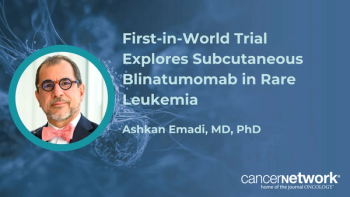
Maintenance Rituximab Valuable Option for CLL in the Elderly
Two years of maintenance chemotherapy with rituximab resulted in improved progression-free survival among elderly patients with chronic lymphocytic leukemia.
Two years of maintenance chemotherapy with rituximab resulted in improved progression-free survival among elderly patients with chronic lymphocytic leukemia (CLL), according to the results of a study
“Of note, the benefit of maintenance therapy on progression-free survival was observed in different subgroups, even in patients with adverse prognostic features such as age 70 years or older, unmutated IGHV status, presence of del(11q), and partial response or minimal residual disease positivity at the time of response assessment before randomization,” wrote Caroline Dartigeas, MD, of Hôpital Bretonneau, CHU Tours in Tours, France, and colleagues. “Progression-free survival outcome was also consistent irrespective of cytogenetics.”
According to the researchers, most patients with CLL treated with initial chemotherapy plus rituximab will relapse. This randomized multicenter study was designed to test the efficacy and safety of 2-year maintenance rituximab compared with observation among patients aged 65 and older treated with frontline abbreviated induction by fludarabine, cyclophosphamide, and rituximab (FCR).
Included patients had an Eastern Cooperative Oncology Group (ECOG) status of 0 or 1 and adequate renal and liver function. Eligible patients had responded to induction treatment with four monthly courses of full-dose FCR with two interim rituximab doses and oral cyclophosphamide. Patients were then randomly assigned to rituximab every 8 weeks for up to 2 years or observation.
The study enrolled 542 patients; 525 started FCR induction, and 409 underwent randomization. After a median follow-up of almost 4 years, the median progression-free survival was 59.3 months for rituximab compared with 49 months for observation (hazard ratio, 0.55; 95% CI, 0.40–0.75; P = .0002). Overall survival was similar between the two groups, with a median not yet reached for both.
Patients assigned to rituximab had significantly improved progression-free survival in several subgroups, including those with IGHV unmutated disease (49.7 months for rituximab vs 37.1 months for observation), those older than 70 years, those with 11q deletion (46.5 months vs 37.1 months), those without 11q deletion (not reached vs 59.3 months), and those with negative minimal residual disease at the end of induction (not reached vs 61 months). No benefit was seen in patients with mutated IGHV.
“The obvious gain in quality of life for a patient who can live without relapse and does not need to start a new treatment must be balanced against the adverse events associated with maintenance therapy,” the researchers noted.
Patients assigned rituximab experienced increased neutropenia and grade 3/4 infections compared with observation. The most common grade 3/4 infection was lower respiratory tract infection. There was no difference in the occurrence of second cancers between the two study arms.
According to the researchers, new strategies for CLL treatment are exploring the use of BCR inhibitors and BCL-2 antagonists, which do not have the classic toxicities of immunosuppression. It is possible that these drugs could be combined with rituximab to enhance their activity, they noted.
“At present, however, no data from phase III trials comparing FCR followed by maintenance rituximab with BCR inhibitors or BCL-2 antagonists are available,” the researchers wrote. “Specific challenges are associated with continuous administration of BCR inhibitors or BCL-2 antagonists in elderly patients, such as pharmacoeconomic considerations, compliance, drug interaction, undefined long-term adverse events, potential clonal selection, and resistance. For the latter reasons, maintenance strategies with rituximab, irrespective of hematological toxicity, could still be considered as a potential option to be compared with targeted therapies in randomized studies.”
Newsletter
Stay up to date on recent advances in the multidisciplinary approach to cancer.












































